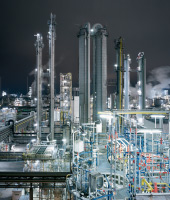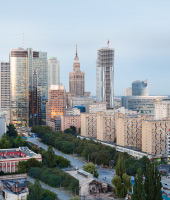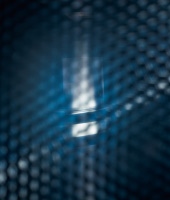WACKER Stock in 2014
News from the solar and semiconductor industries influenced the performance of WACKER’s share price in 2014. The stock additionally benefited from good business trends at the chemical divisions as of the third quarter.
The financial and debt crisis in Europe and the USA continued to have less of an impact on global financial-market sentiment in the first quarter. On the other hand, weak growth figures from Asia, especially China, unsettled capital markets. Another negative factor was the conflict between Russia and Ukraine precipitated by Russia’s annexation of the Crimean peninsula in March 2014. This action and the associated political instability in Europe impacted capital markets substantially. WACKER stock profited from the positive market response to the agreement the company reached with the Chinese Ministry of Commerce (MOFCOM) on import duties for polysilicon. Effective May 1, 2014, WACKER and the Chinese Ministry of Commerce signed an agreement in which the Group undertakes not to sell European-manufactured polysilicon in China below a specific minimum price based on standard market prices. The Chinese Ministry of Commerce, in turn, will refrain from imposing anti-dumping or anti-subsidy duties on this material. Given these conditions, WACKER stock performed well during the first quarter of 2014. With a quarterly gain of 10.8 percent, WACKER’s stock significantly outperformed Germany’s DAX and MDAX equity indices – which essentially moved sideways. The DAX gained 1.7 percent in Q1 2014, while the MDAX edged down 0.3 percent in the same period.
WACKER’s share price started the year at € 80.00 on January 2, 2014. It rose to its first-quarter high of € 103.65 on March 6, 2014. Several positive news items lifted the share price during this period. When it published its preliminary 2013 figures, for instance, the Group reported on a solid final quarter of 2013. WACKER’s acquisition of a majority stake in its semiconductor-wafer joint venture with Samsung was just as well-received by market participants as the announcement concerning special income from restructuring a contractual and delivery relationship with a solar-sector customer. The share price declined again somewhat in the weeks thereafter, closing the quarter at € 88.63. This corresponded to a market capitalization of about € 4.4 billion.
The geopolitical situation in the rest of the year was dominated by repeated flare-ups of the conflicts in Ukraine, Syria and Iraq. Political and military strife in these countries caused market uncertainty about the global economy and the stability of international trade relations. The primary factor influencing capital markets was the stance taken by major central banks in the USA and Europe to continue their expansionary monetary policy. In response to low inflation and emerging deflationary fears in Europe, the European Central Bank (ECB) lowered the main refinancing rate, its most important policy rate, from 0.25 percent to 0.15 percent.
After gaining a good 10 percent during the first three months of 2014, WACKER stock had a more subdued performance from April through June. The share price lost some ground in that quarter, falling 6.3 percent. One reason for the decline was the fact that analysts had slightly lowered their expectations for short-term growth and earnings in the chemical sector. The DAX and the MDAX were also virtually unchanged during the same period, having gained 2.4 percent and 1.3 percent, respectively. On May 19, 2014, WACKER’s share price reached its lowest closing price of € 77.11. This movement was preceded by reports of very low figures for solar system installations in China, which affected expectations for the solar business. In addition, the trade dispute between China and the USA involving imports of solar modules into the USA and polysilicon exports to China intensified again.
Neither publication of the Q1 report on May 5 nor the Annual Shareholders’ Meeting on May 15 had any noticeable impact on the share price. As the second quarter progressed, WACKER stock recovered, closing at € 84.33 at the end of that quarter.
Geopolitical tensions and armed conflict in Ukraine and the Middle East dominated international financial-market sentiment in the third quarter. Concern about economic developments also held back equity markets. Between July and September, WACKER stock strongly outperformed both the DAX and the MDAX. It was quoted at € 88 at the start of the quarter and climbed to a high of € 98.45 on September 25. At the end of the third quarter, WACKER’s share price was € 95.81 – a gain of over 9 percent. In the same period, the DAX lost 4.3 percent and the MDAX was down 4.4 percent. There were several reasons why WACKER stock outperformed the market, including good news from the solar market, price stabilization in silicon wafers and better-than-expected sales volumes at the chemical divisions.
In the fourth quarter, plunging crude-oil prices, weakness of the euro against the US dollar and weak economic growth in major EU countries such as France and Italy determined the course of capital markets. The ECB’s expansionary monetary policy drove the euro down from US$1.26 to below US$1.22 in the final three months of the year. Less-than-satisfactory figures from some chemical-industry companies caused analysts to lower expectations for the entire chemical sector. In light of the good Q3 results, WACKER raised its full-year forecast, which was rewarded by the market. The ongoing tariff dispute between China and the USA concerning solar-module imports to the USA and polysilicon exports to China prompted negative analyst commentary about future solar-industry growth, as did potential cutbacks in subsidies for new solar installations in Japan. WACKER stock opened Q4 at € 96.46 and closed the quarter at € 91.05 – a drop of 5.9 percent. The DAX and the MDAX, on the other hand, gained 4.5 percent and 7 percent, respectively, in Q4 2014.



